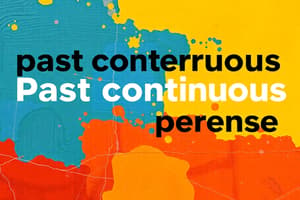Podcast
Questions and Answers
Which structure accurately represents the Present Perfect tense?
Which structure accurately represents the Present Perfect tense?
- Subject + had + verb-ing
- Subject + has/have + past participle (correct)
- Subject + am/is/are + verb-ing
- Subject + base form of the verb
Identify the correct structure used for forming the Past Continuous tense.
Identify the correct structure used for forming the Past Continuous tense.
- Subject + was/were + verb-ing (correct)
- Subject + has/have + past participle
- Subject + past form of the verb
- Subject + has/have been + verb-ing
What is the structure for the Present Continuous tense?
What is the structure for the Present Continuous tense?
- Subject + has/have + past participle
- Subject + was/were + verb-ing
- Subject + had been + verb-ing
- Subject + am/is/are + verb-ing (correct)
Which of the following structures is used for the Past Perfect tense?
Which of the following structures is used for the Past Perfect tense?
Which example correctly illustrates the Simple Present tense?
Which example correctly illustrates the Simple Present tense?
What structure defines the Present Perfect Continuous tense?
What structure defines the Present Perfect Continuous tense?
Flashcards are hidden until you start studying
Study Notes
Tense
Present Tense
-
Definition: Indicates actions happening currently or habitual actions.
-
Types:
-
Simple Present:
- Structure: Subject + base form of the verb (add ‘s’ or ‘es’ for third person)
- Example: "She walks to school."
-
Present Continuous (Progressive):
- Structure: Subject + am/is/are + verb-ing
- Example: "They are studying for exams."
-
Present Perfect:
- Structure: Subject + has/have + past participle
- Example: "I have finished my homework."
-
Present Perfect Continuous:
- Structure: Subject + has/have been + verb-ing
- Example: "He has been working here for five years."
-
Past Tense
-
Definition: Indicates actions that have already occurred.
-
Types:
-
Simple Past:
- Structure: Subject + past form of the verb
- Example: "She visited Paris last year."
-
Past Continuous (Progressive):
- Structure: Subject + was/were + verb-ing
- Example: "They were watching a movie."
-
Past Perfect:
- Structure: Subject + had + past participle
- Example: "I had already eaten when she arrived."
-
Past Perfect Continuous:
- Structure: Subject + had been + verb-ing
- Example: "He had been sleeping for two hours before the alarm rang."
-
Present Tense
-
Defines actions occurring currently or regular behaviors.
-
Simple Present: Uses the base verb form; add ‘s’ or ‘es’ for third-person singular.
- Example: "She walks to school."
-
Present Continuous (Progressive): Formed with am/is/are + verb-ing to indicate ongoing actions.
- Example: "They are studying for exams."
-
Present Perfect: Constructed with has/have + past participle, denoting actions completed at some point before now.
- Example: "I have finished my homework."
-
Present Perfect Continuous: Uses has/have been + verb-ing to express ongoing actions that started in the past and continue to present.
- Example: "He has been working here for five years."
Past Tense
-
Indicates actions that have already taken place.
-
Simple Past: Form uses the past form of the verb to show completed actions.
- Example: "She visited Paris last year."
-
Past Continuous (Progressive): Formed with was/were + verb-ing to illustrate actions that were ongoing in the past.
- Example: "They were watching a movie."
-
Past Perfect: Requires had + past participle, indicating actions that occurred before another past action.
- Example: "I had already eaten when she arrived."
-
Past Perfect Continuous: Constructed with had been + verb-ing, emphasizing the duration of an action before another past event.
- Example: "He had been sleeping for two hours before the alarm rang."
Studying That Suits You
Use AI to generate personalized quizzes and flashcards to suit your learning preferences.




